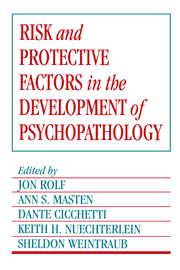Book contents
- Frontmatter
- Contents
- List of contributors
- Preface
- Part I Introduction: Historical and theoretical roots of developmental psychopathology
- 1 A historical perspective on the discipline of developmental psychopathology
- 2 What is “developmental” about developmental psychopathology?
- Part II Contributions of the high-risk child paradigm: continuities and changes in adaptation during development
- Part III Competence under adversity: individual and family differences in resilience
- Part IV The challenge of adolescence for developmental psychopathology
- Part V Factors in the development of schizophrenia and other severe psychopathology in late adolescence and adulthood
- A closing note: Reflections on the future
- Author index
- Subject index
2 - What is “developmental” about developmental psychopathology?
Published online by Cambridge University Press: 06 August 2010
- Frontmatter
- Contents
- List of contributors
- Preface
- Part I Introduction: Historical and theoretical roots of developmental psychopathology
- 1 A historical perspective on the discipline of developmental psychopathology
- 2 What is “developmental” about developmental psychopathology?
- Part II Contributions of the high-risk child paradigm: continuities and changes in adaptation during development
- Part III Competence under adversity: individual and family differences in resilience
- Part IV The challenge of adolescence for developmental psychopathology
- Part V Factors in the development of schizophrenia and other severe psychopathology in late adolescence and adulthood
- A closing note: Reflections on the future
- Author index
- Subject index
Summary
As a graduate student at Minnesota in 1963, I naively thought it obvious that our understanding of psychopathology could be advanced by studying it in relation to developmental changes. This seemed most apparent with respect to disorders of childhood and adolescence. Yet it also seemed apparent with respect to the possible roots of adult disorders in earlier developmental periods and to the differences between disorders occurring at different periods of adult development.
The relevance of development to psychopathology seemed especially compelling in light of the major theories of the day. These theories emphasized the early history of the individual as a source of psychopathology and implied that early events had a marked impact on later development. They disagreed on what the most influential early determinants might be, whether psychodynamic, learning, genetic, or pathophysiological, but none had documented the form that childhood disorders actually took. In fact, anyone hoping to study the developmental course of child and adolescent disorders faced a nosology that until 1968 distinguished only between Adjustment Reaction of Childhood and Schizophrenic Reaction, Childhood Type (DSM-I, American Psychiatric Association, 1952).
Since that time, interest in childhood disorders has grown, spawning numerous distinctions among disorders that are thought to characterize children. DSM-II, DSM-III, and DSM-III-R all introduced diagnostic distinctions that had little prior history or research support (American Psychiatric Association, 1968, 1980, 1987). These distinctions reflect implicit assumptions about the nature of childhood disorders, largely extrapolated from concepts of adult disorders. Although research on adults undoubtedly offers useful concepts and data, it tends to portray childhood disorders as miniature versions of adult disorders, especially where we lack a clear picture of what constitutes the disorders actually occurring in children.
- Type
- Chapter
- Information
- Publisher: Cambridge University PressPrint publication year: 1990
- 14
- Cited by



